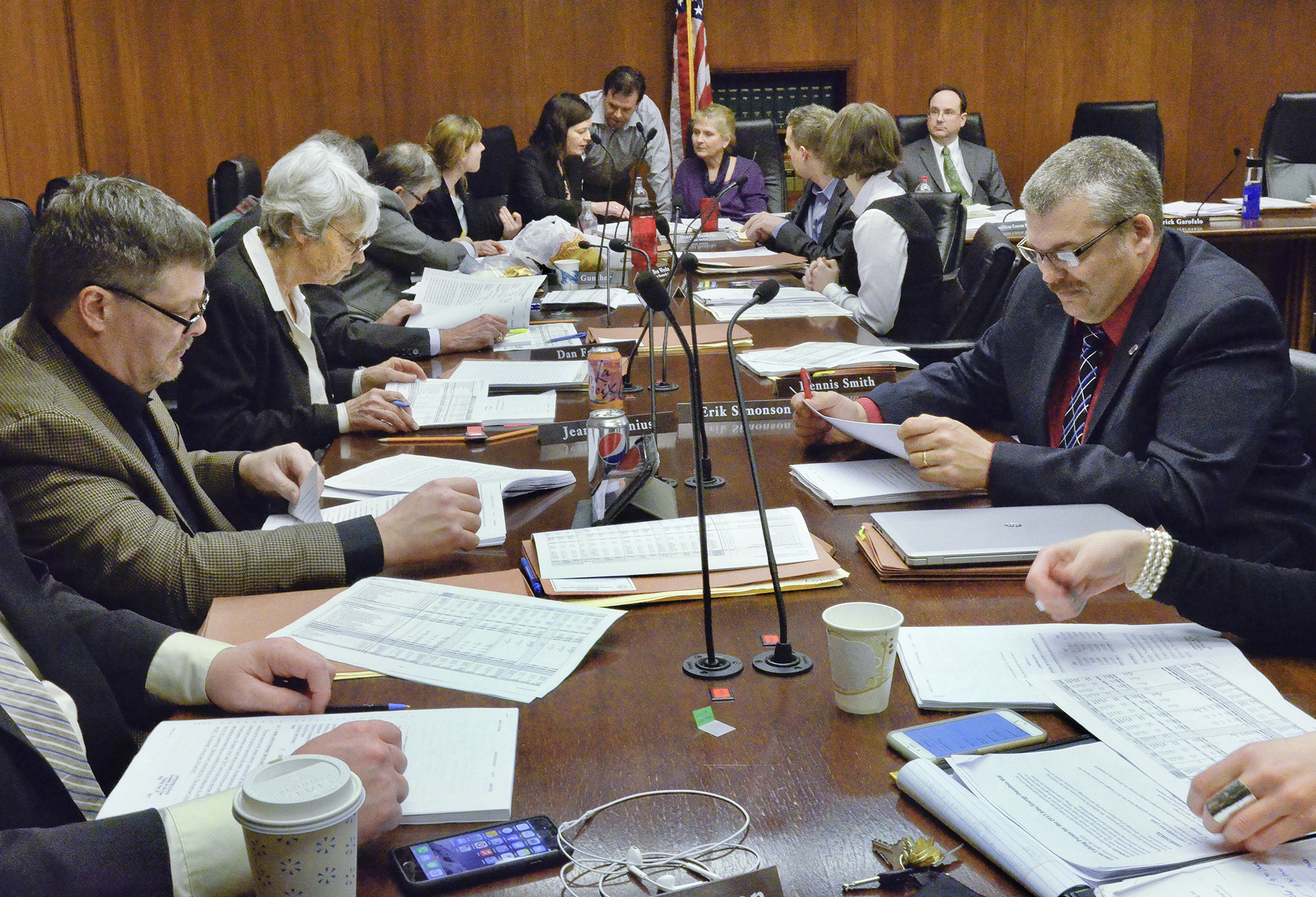Job growth and energy affordability omnibus bill tackles wide range of issues

Updated 11:50 a.m. April 10, 2015
Utilities could use sources of energy other than the sun to meet the state’s solar energy standard, and cities could use tax-increment financing to fund new apartments for workers, under the omnibus job growth and energy affordability bill unveiled Wednesday.
HF843, as proposed to be amended, reflects the dual nature of the House Job Growth and Energy Affordability Policy and Finance Committee, which has jurisdiction over the Public Utilities Commission on the energy side and 10 agencies on the jobs side.
The bill’s sponsor, Committee Chair Rep. Pat Garofalo (R-Farmington), calls it a “fiscally conservative bill … 152 pages of absolute legislative awesomeness” with significant energy reform and investments in workforce development and housing.
Garofalo spoke hours before the committee took up the bill at an unusual press conference, answering questions submitted by email and Twitter over the Meerkat online livestream video service — an apparent first for the House.
What would HF 843 do?
The bill includes energy-related measures that would, among other things:
- create a rebate program for property owners who install geothermal heat pumps or energy storage, wind energy or solar thermal systems;
- set an expiration date of Dec. 31, 2016, for the Conservation Improvement Program (CIP), and establish an energy conservation advisory task force to make recommendations on conservation policy by Feb. 1, 2016;
- eliminate the goal that solar energy generate 10 percent of retail electric sales by 2030;
- allow public utilities to satisfy the state’s solar energy standard by wind, hydroelectric or biomass energy — if they are cheaper;
- require legislative approval for the Pollution Control Agency’s proposal to meet the U.S. Environmental Protection Agency’s new Clean Power Plan requirements; and
- repeal the ban on new nuclear-powered electric generating plants.
The bill also includes jobs-related measures that would, among other things:
- establish a Minnesota State Colleges and Universities system training program for skilled manufacturing jobs;
- allow small businesses to raise capital through crowdfunding via a MNvest website not required to register for the sale of securities;
- require legislative approval of Metropolitan Council plans, goals and funds for affordable and life-cycle housing;
- allow cities to apply tax-increment financing to workforce housing development projects; and
- reduce unemployment-insurance taxation by capping the Unemployment Insurance Trust Fund and returning excess funds to taxpayers in the form of tax credits.
The omnibus job growth and energy affordability bill cuts $17.73 million from base level General Fund spending and adds $2.86 million in revenue to meet the $3.31 billion budget target — $20.59 million below base. Agencies receiving less money than indicated by the base in the February Budget Forecast are:
- Department of Employment and Economic Development: $16.63 million
- Minnesota Housing Finance Agency: $10.55 million
- Public Utilities Commission: $1.45 million
- Bureau of Mediation Services: $900,000
Agencies receiving an increase over the base:
- Department of Commerce: $7.98 million
- Explore Minnesota Tourism: $2.8 million
- Department of Labor and Industry: $1.01 million
Receiving amounts in line with the base are the Workers Compensation Court of Appeals, Iron Range Resources Board, Public Facilities Authority and Destination Medical Center.
Testimony on the bill is set to continue Friday and possibly Saturday. The deadline for amendments is 2 p.m. Friday. If approved, the bill would continue to the House Ways and Means Committee and House Taxes Committee.
The companion, SF804, sponsored by Sen. James Metzen (DFL-South St. Paul), awaits action by the Senate Jobs, Agriculture and Rural Development Committee.
What’s in the bill?
The following are some of the high-profile House files included in HF 843:
HF335 (Clark); HF434 (Fabian); HF550 (Baker); HF579 (Franson); HF662 (Mahoney); HF684 (Fabian); HF713 (Loonan); HF750 (Kiel); HF776 (Sanders); HF939 (Baker); HF1023 (Hamilton); HF1290 (Loonan); HF1416 (Smith); HF1693 (Atkins/Loonan); HF1969 (Vogel)
Related Articles
Search Session Daily
Advanced Search OptionsPriority Dailies
Ways and Means Committee OKs proposed $512 million supplemental budget on party-line vote
By Mike Cook Meeting more needs or fiscal irresponsibility is one way to sum up the differences among the two parties on a supplemental spending package a year after a $72 billion state budg...
Meeting more needs or fiscal irresponsibility is one way to sum up the differences among the two parties on a supplemental spending package a year after a $72 billion state budg...
Minnesota’s projected budget surplus balloons to $3.7 billion, but fiscal pressure still looms
By Rob Hubbard Just as Minnesota has experienced a warmer winter than usual, so has the state’s budget outlook warmed over the past few months.
On Thursday, Minnesota Management and Budget...
Just as Minnesota has experienced a warmer winter than usual, so has the state’s budget outlook warmed over the past few months.
On Thursday, Minnesota Management and Budget...